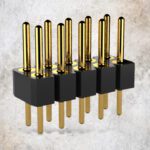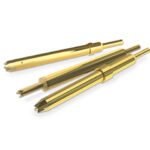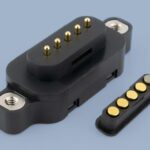Press-Fit Pin and Receptacle Solutions for Military and Aerospace Applications
Military and aerospace electronics demand high degrees of system reliability and signal integrity. For these and other applications, precision-machined press-fit pins and receptacles provide an ideal solution.
By Stephen Capitelli, Manager of Product Engineering, Mill-Max Mfg. Corp.
Sometimes, the products that we take for granted are among the most important. For example, the quality of the fasteners that secure the skin to the air-frame on ultra-high-tech aircraft are integral, as failure could be catastrophic. The press-fit pins and receptacles that we apply to interconnect electronic modules are another such example. Electronic circuitry interconnected by press-fit pins and receptacles is so broad in application that its critical role in system performance cannot be given short shrift.
Press-fit pins and receptacles are among the most versatile types of interconnection components for electrical and electronic applications. Individual pins and receptacles are available in sizes suited to particular form factors, and they may be used for the transmission of signals from power on down to logic level.

Figure 1: Press-fit pins and receptacles are offered in a variety of configurations. Designed for use in non-plated through-hole applications, the press-fit barb on the left and the press-fit knurl on the right offer unique retention features for enhanced reliability.
Pins and receptacles, used individually or in pairs, can be useful for terminating a single wire to a PCB. Used in groups, press-fit pins and receptacles are perfect for daughterboard-to-PC-motherboard, component-to-PCB, module-to-PCB, cable-to-PCB, cable-to-cable, and fuse applications, among others.
Military and aerospace electronics demand high degrees of system reliability and signal integrity. For these and other applications, precision-machined press-fit pins and receptacles provide an ideal solution. Specialized, precision-machined pin technology offers multiple advantages over stamped-and-formed connectors, including:
- Seamless construction prevents contact contamination from wave or reflow soldering.
- Specialized press-fit feature geometries (triangle, square, hexagon, octagon) are available to meet the various hole-size requirements of specific applications.
- Lead-in countersinks on pin receptacles facilitate pin alignment.
- Pins and receptacle shells are made of a copper alloy primarily comprised of free-machining UNS C36000 (half-hard) and C38500 brass, both of which are known for superior machinability and good electrical and thermal conduction properties. These materials, when used in high-speed precision manufacturing, produce parts with tight tolerances and excellent finishes. Phosphor bronze, characterized by greater tensile strength, and tellurium copper, characterized by superior electrical and thermal conductivity, are also available for specialized applications.
- Multi-finger beryllium copper contact clip scores the mating device lead for gas-tight electrical connections and the best power and force distribution.
- Two-piece receptacle construction (shell and contact clip) enables cost-effective plating combinations for optimal solderability and conductivity.
Press-fit pins and receptacles fall into two distinct categories: those for PCB plated through-holes (solderless press-fit) and those for non-plated through-holes, such as bare PCB holes, plastic housings, and insulators. Press fitting utilizes material displacement, a process in which the pin deforms both the mating hole shape and diameter. One exception is compliant press-fit pins, as they conform to the hole size as they are pressed in.
Solderless press-fit pins and receptacles are utilized in applications where soldering is not reliable or economical, such as thick printed circuit boards and backplanes. Oftentimes, press fitting is the more efficient manufacturing solution for: bringing power or control signals onto SMT boards via cable, discreet wires, or a daughter card; board stacking applications; and adapter boards for footprint translation, which is especially useful when a chip is converted from a through-hole to an SMT package.
When pressed into properly sized plated holes on a circuit board, press-fit pins will form a gas tight connection, which provides a reliable electrical interface characterized by stable impedance and no oxidization. Since applications vary greatly, the physical configurations that determine how the pins and receptacles mount and function also vary. A few of the most common configurations include:
- Press-Fit Barbs for Non-Plated Through-Holes. Many pins, receptacles, and spring-pin connectors use this design for retention purposes in insulators or plastic housings.
- Press-Fit Knurls for Non-Plated Through-Holes. Vertical serrations are machined around the diameter of an interconnect pin. This provides a retention feature for press fitting in a non-plated PCB hole or insulator, while also preventing pin rotation.
- Press-Fit Polygons for Plated Through-Holes. These unique designs provide a solderless press-fit interconnect for PCBs, and are especially useful for troublesome, hard-to-solder thick PCB and backplanes.
- Press-Fit Compliant Tails for Plated Through-Holes. A drilled and slotted receptacle or pin-tail is pressed into a plated 0.040̎”±0.003” PCB through-hole, allowing users to mount an interconnect component to a PCB without damaging the hole. No post-assembly soldering is required.
- Press-Fit Compliant Bodies for Plated Through-Holes. These receptacles can be press-fit into non-plated or plated through-holes, and soldering is optional for plated through-holes. An important benefit of this design is that it allows the receptacle to have a low profile of only 0.030” above the PCB.

Figure 2: Press-fit polygons for plated through-hole applications
Quality is Critical
The quality and construction of pins and receptacles can vary considerably by manufacturer. To achieve the highest quality and reliability, press-fit pins and receptacles should be machined to tight tolerances and plated with metals that provide the highest conductivity and corrosion protection available. Machined pin connectors are field-proven interconnect solutions for demanding military and aerospace markets. When system reliability is critical, success can depend on the smallest parts. When failure is not an option, precision-machined press-fit pins and receptacles are a perfect solution.
About Mill-Max Mfg. Corp.
Mill-Max Mfg. Corp. is a leading supplier of standard and custom spring-loaded connector solutions, offering a comprehensive range of standard spring-loaded contacts and connectors comprised of more than 70 different product families containing almost every conceivable configuration, in addition to 45 different target connectors and 28 loose pin-target products.
Visit Mill-Max Mfg. Corp. online.
Interested in a specific market? Click a market below for current articles and news.
Automotive, Consumer, Industrial, Medical, Mil/Aero, Datacom/Telecom, and Transportation












